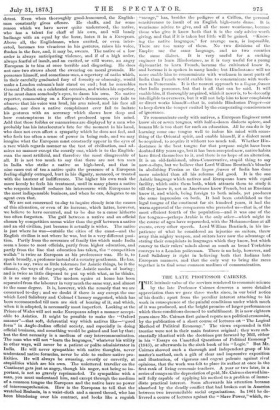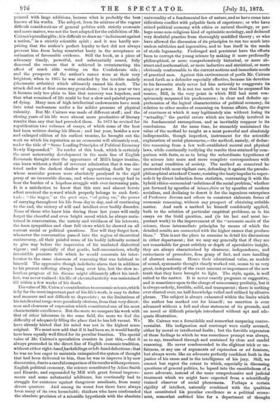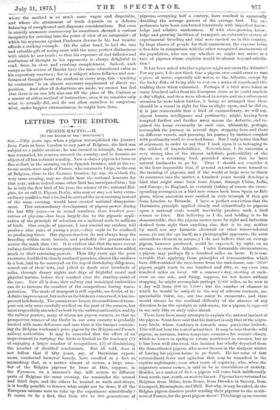TILE LATE PROFESSOR CAIRNES.
THE intrinsic value of the services rendered to economic science by the late Professor Cairnes deserves a more detailed appreciation than we gave three weeks since, in our brief notice of his death ; apart from the peculiar interest attaching to his work in consequence of the painful conditions under which much of it was produced, and the bright promise of larger performances which these conditions doomed to unfulfilment. It is now eighteen years since Mr. Cairnes first gained repute as a political economist, by the publication of a short course of lectures oil " The Logical Method of Political Economy." The views expounded in this treatise were not in their main features original ; they were sub- stantially identical with the doctrines put forward by Mill, either in his " Essays on Unsettled Questions of Political Economy" (184$), or afterwards in the sixth book of his " Logic." But Mr. Cairnes showed such a thorough and independent grasp of his master's method, such a gift of clear and impressive exposition and illustration, of vigorous and cogent polemic against rival opinions, that the work was felt to place its author at once in the first rank of living economic teachers. A year or two later, in a series of essays on the depreciation of gold, Mr. Cairnes showed him- self fully capable of applying his method to a problem of imme- diate practical interest. Soon afterwards his attention became absorbed by the deadly conflict that had broken out in America between two irreconcilable social organisations. In 1861 he de- livered a course of lectures against the " Slave Power," which, re- printed with large additions, became what is probably the best, known of his works. The subject, from its mixture of the vaguer difficult considerations of general politics with strictly economic and more matter, was not the best adapted for the exhibition of Mr. Cairnes's peculiargifts ; it is difficult to draw an " indictment against a nation," in a strictly scientific spirit ; and it was hardly sur- prising that the author's perfect loyalty to fact did not always prevent him from being somewhat hasty in the acceptance or estimation of favourable evidence. Still the book, as a piece of advocacy timely, powerful, and substantially sound, fully deserved the success that it achieved in counteracting the effect of much able writing on the Confederate side ; and the prospects of the author's career were at their very brightest, when in 1865 he was 'attacked by the terrible malady (rheumatic arthritis) which ultimately caused his death. The attack did not at first cause any great alarm ; but in a year or two it became only too plain to him that recovery was hopeless, and that what remained of life could be but a slow and painful process of dying. Many men of high intellectual endowments have sunk into total uselessness under a far milder pressure of physical calamity. But Mr. Cairnes was made of different stuff ; and the closing years of his life were almost more productive of literary results than any that had preceded them. In 1873 he revised for republication two volumes of essays, of which some of the best had been written during his illness ; and last year, besides a new and enlarged edition of his earliest treatise, he brought out the work on which his reputation as an economist will ultimately rest, under the title of "Some Leading Principles of Political Economy Newly Expounded." No reader of this book, which is certainly the most noteworthy development in the main line of English Economic thought since the appearance of Mill's larger treatise, can learn without a thrill of reverent admiration that it was dic- tated under the darkest shadow of approaching death by one whose muscular powers were absolutely paralysed in the rigid grasp of an inexorable disease, and whose nervous energy had to bear the burden of a hopeless struggle with ever-increasing pain. It is a satisfaction to know that this rare and almost heroic effort received the reward which properly belongs to such forti- tude; "the wages," as the poet says, "of going on," the power of carrying throughout his life from day to day, and of continuing to the end, the victory of will and intellect over bodily disorder. None of those who knew him during these last years will easily forget the cheerful and even bright mood which he always main- tained in conversation, the variety and vividness of his interests, the keen sympathies and clear full views which he showed on all current social or political questions. Nor will they forget how, whenever the conversation passed into the region of theoretical controversy, all their painful sense of his bodily infirmity seemed to give way before the impression of his unabated dialectical vigour ; and especially of that gentle, half-unconscious, wholly irresistible pressure with which he would constrain his inter- locutor to the same closeness of reasoning that was habitual to himself. The oppressive though indefinite alarm that in addition to his present suffering always hung over him, lest the slow re- lentless progress of his disease might ultimately affect his intel- lect, was never realised; his life of elevated activity was maintained till within a few weeks of his death.
The value of Mr. Cairnes's contribution to economic science,which is by far the most important part of his life's work, is easy to define and measure and not difficult to depreciate ; as the limitations of his intellectual range were peculiarly obvious, from that very direct- ness and clearness of expression which constituted one of his most characteristic excellences. But the more we compare his work with that of other labourers in the same field, the more we feel the difficulty of adequately filling the place that he has left vacant. We have already hinted that his mind was not in the highest sense original. We must now add that if it had been so, it would hardly have been equally well fitted for its peculiar function. The special value of Mr. Cairnes's speculation consists in just this,—that it always proceeded in the direct line of English economic tradition, without either right-hand.backslidings orleft-hand defections; that he was no less eager to maintain unimpaired the system of thought that had been delivered to him, than he was to improve it by new discoveries, dueto a careful comparison of its results with experience. English political economy, the science constituted by Adam Smith and Ricardo, and expounded by Mill with great formal improve- ments and some substantial additions, has continually had to struggle for existence against dangerous assailants, from many divers quarters. And among its worst foes there have always been many of its own household; thinkers who have confounded the absolute precision of a scientific hypothesis with the absolute universality of a fundamental law of nature, and so have come into ridiculous conflict with palpable facts of experience; or who have • mixed political economy with ethics or natural theology, or per- haps some non-religious kind of optimistic sociology, and deduced very doubtful practice from thoroughly muddled theory ; or who have allowed the discussion of its principles to run too much into useless subtleties and ingenuities, and to lose itself in the sands of sterile logomachy. Prolonged and persistent have the efforts been to corrupt the young science by making it more profoundly philosophical, or more comprehensively historical, or more ab- stract and mathematical, or more inductive and statistical, or more obviously conformable to the current notions and immediate needs of practical men. Against this environment of perils Mr. Cairnes stood forth as a defender especially effective, because his devotion to his favourite study never led him seriously to exaggerate its scope or power. It is not too much to say that he surpassed his master, Mill, in the very point in which Mill had most con- spicuously surpassed his predecessors ; in clear and definite ap- prehension of the logical characteristics of political economy, its relation to other modes of reasoning on human affairs, the degree of exactness at which it may legitimately aim without losing its "actuality," the partial errors which are inevitably involved in, its fundamental assumptions, and as inevitably reappear in its conclusions. At the same time, he staunchly maintained the value of the method he taught as a most powerful and absolutely indispensable, though imperfect, instrument for the scientific- explanation of social phenomena,—the method, namely, of deduc- tive reasoning from a few well-established mental and physical laws, while continually verifying the results thus attained by com- parison with facts, so as to bring the subordinate hypotheses of- the science into more and more complete correspondence with the actual condition of society. The method so conceived he protected with most vigilant care, defending it against the pseudo- philosophical attacks of Comte, resisting the hastyimpulse to super- sede it by direct induction from statistics, contrasting it with the hybrid ethico-economical solutions of the social problem,' whether put forward by apostles of laissez-faire or by apostles of modern socialism, and declining to desert it for the ingenious enterprises of Professor Jevons and others to construct elaborate forms of economic reasoning, without any prospect of obtaining suitable matter. And such a method he himself confidently applied, both to the solution of particular empirical problems, as in his essays on the Gold question, and (in his last and most im- portant work) to the improvement of the "axiomata media of the science, those intermediate principles by means of which the detailed results are connected with the higher causes that produce them." This is not the place to examine in detail his discussions in either department ; but we may say generally that if they are not remarkable for great subtlety or depth of speculative insight, they are always characterised by clearness, independence, and correctness of procedure, firm grasp of fact, and sure handling of abstract notions. Hence their educational value, as models of sound, systematic thought clearly worked out, seems to us very great, independently of the exact amount or importance of the new truth that they have brought to light. The style, again, is well suited to the matter. It is never exactly pregnant or suggestive, and is sometimes open to the charge of unnecessary prolixity, but it is always orderly, forcible, solid, and transparent ; there is nothing- ever slurred over, no half-knowledge veiled and utilised by allusive phrase. The subject is always exhausted within the limits which the author has marked out for himself ; no assertion is ever advanced without a full and clear statement of its grounds, and no novel or difficult principle introduced without apt and ade- quate illustration.
Mr. Cairnes was a formidable and somewhat unsparing contro- versialist. His indignation and contempt were easily aroused, either by moral or intellectual faults ; but the forcible expression of these feelings to which he was sometimes prompt was always, so to say, transfused through and sustained by close and candid reasoning. He never condescended to the slightest trick or un- fairness, or any use of arguments ad captandum or ad hominem, but always wrote like an advocate perfectly confident both in the justice of his cause and in the intelligence of his jury. Still, we cannot but regret the extent to which, especially in discnaaing questions of general politics, he lapsed into the onesidedness of a, mere advocate, instead of the more comprehensive and judicial treatment which we might have expected from a scientifically trained observer of social phenomena. Perhaps a certain rigidity of intellect, naturally combined with the qualities that constituted his peculiar excellence as a political econo- mist, somewhat unfitted him for a department of thought
where the method is so much more vague and disputable, and where the attainment of truth depends on a delicate balancing of complicated and disparate considerations. But even in strictly economic controversy he sometimes showed a curious incapacity for entering into the point of view of an antagonist ; of which his argument against Professor Jevons in his last treatise affords a striking example. On the other hand, he had the rare and valuable gift of seeing error with the same perfect distinctness with which hs saw truth ; so that his exposure of real fallacies and confusions of thought in his opponents is always delightful to read, from its clear and crushing completeness. Indeed, such essays as his review of Bastiat have the same educational value as his expository treatises ; for in a subject where fallacies and con- fusions of thought beset the student at every step, this "teaching by contraries " is an almost necessary supplement of direct ex- position. And after all deductions are made, we cannot but feel that there is no one left who can fill the place of Mr. Cairnes as a master of either method of instruction; even if we consider only what he actually did, and do not allow ourselves to conjecture what, under happier circumstances, he might have done.
































 Previous page
Previous page